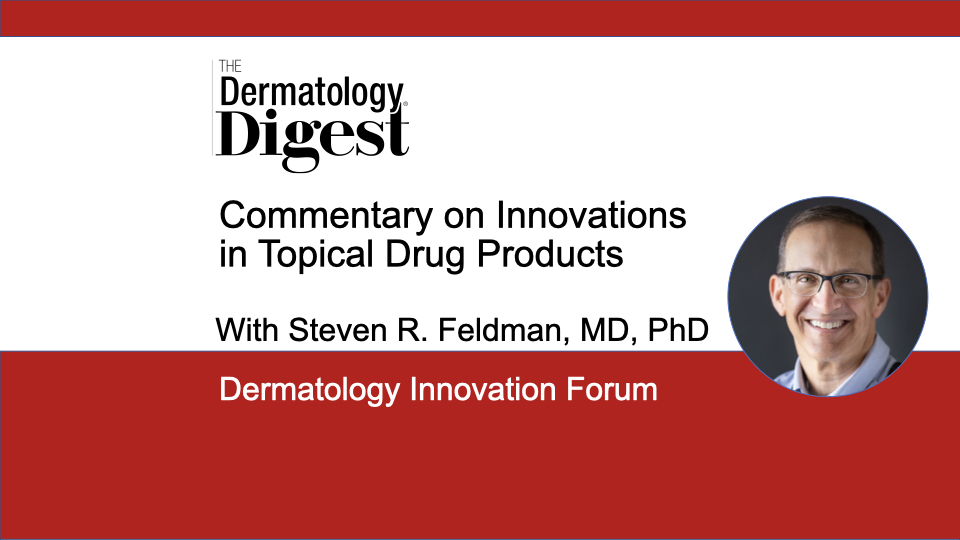Dr. Steven R. Feldman discusses technology advancements for better patient adherence to topical therapies, including ongoing research.
Steven R. Feldman, MD, PhD, Professor of Dermatology, Pathology and Social Sciences and Health Policy, Wake Forest School of Medicine, Winston-Salem, North Carolina
“Here’s the problem. We know skin diseases are horrible. We already have some great treatments, but patients don’t always apply the medicines the way they’re supposed to,” said Steven R. Feldman, MD, PhD, who presented on adherence monitoring during the “Innovations in Topical Drug Products” session at the Dermatology Innovation Forum in New Orleans.
In addition to treating dermatology patients, Dr. Feldman said that for more than 20 years he has studied patient adherence using electronic monitoring devices to assess medication use.
“We have found patients with psoriasis, atopic dermatitis, acne—people with bad diseases who wanted to get better but were still not using their medications.”
But conventional adherence monitoring devices tell only part of the story, said Dr. Feldman. While technology notifies researchers when patients open and close bottles of medicine, these devices do not reveal how much medication patients use, nor do they help scientists and clinicians better understand adherence to topical therapy, which is the foundation of dermatological treatment, he said.
“Patients’ adherence to topical therapy is particularly abysmal. It’s so bad they even let me put the word ‘abysmal’ in the title of one of the journal articles I wrote on how poorly patients use their medicine.”1
According to Dr. Feldman, he has been working with Sensal Health, which makes a device that tells researchers and subjects/patients the day and time of medication application, medication reminders, and more.
“[Sensal’s] caps for tubes of topical medication actually weigh the tube. So, you can tell how much medicine people are using for any given dose.”
Dr. Feldman and team have been working to validate the use of these devices, he said.
“In our first study we looked at how accurately it measured time and weight by comparing the amounts that my [researchers] record when they actually use the creams.”
Recently, Dr. Feldman and colleagues used the Sensal devices to study medication use during the Christmas holiday, because patients often don’t take their medicines at all or as much during holidays, he said.
“Sure enough, what we found using these devices was that people commonly stop using their medicines over the holidays. When they did use the medicine, they often applied too little and sometimes too much.”
One of the things that keeps people using their medicine is being in the habit of medication use. And over the holidays, patients risk breaking that habit, said Dr. Feldman.
“One of the cool things about this technology—about being able to measure the weight of each dose—is that you can give people feedback. The Sensal device connects to the patient’s cell phone. If the patient is supposed to put two finger-tip units on their skin, the device can tell the patient how many fingertip units they’re using. And what we found was initially people are terrible, but they learn pretty quickly when you give them feedback.”
The bottom line is that researchers and drugmakers can innovate all the new topicals they want, but the medications are not likely to work like they should if people aren’t using them correctly, said Dr. Feldman.
Thus, medication adherence devices innovations may be more important than the next exciting new topical, he said.
Right now medication adherence technologies are used primarily as research tools, but someday they could become a part of everyone’s medication bottle or tube, said Dr. Feldman.
“For now, I think clinical drug studies ought to be recording how well people are using the medicine and how much they’re using and giving them feedback on how much they’re using so we can better understand how well these drugs work. When topical therapy is successful in the drug study 70% of the time, it makes me wonder if that’s the 70% who are using the medicine.”
Disclosure: Dr. Feldman has received research, speaking and/or consulting support from Eli Lilly and Company, GlaxoSmithKline/Stiefel, AbbVie, Janssen, Alovtech, vTv Therapeutics, Bristol-Myers Squibb, Samsung, Pfizer, Boehringer Ingelheim, Amgen, Dermavant, Arcutis, Novartis, Novan, UCB, Helsinn, Sun Pharma, Almirall, Galderma, Leo Pharma, Mylan, Celgene, Ortho Dermatology, Menlo, Merck & Co, Qurient, Forte, Arena, Biocon, Accordant, Argenx, Sanofi, Regeneron, the National Biological Corporation, Caremark, Teladoc, BMS, Ono, Micreos, Eurofins, Informa, UpToDate and the National Psoriasis Foundation. He is founder and part owner of Causa Research and holds stock in and is a senior advisor for Sensal Health.
Reference:
- Alinia H, Moradi Tuchayi S, Smith JA, et al. Long-term adherence to topical psoriasis treatment can be abysmal: a 1-year randomized intervention study using objective electronic adherence monitoring. Br J Dermatol. 2017;176(3):759-764. doi:10.1111/bjd.15085.

